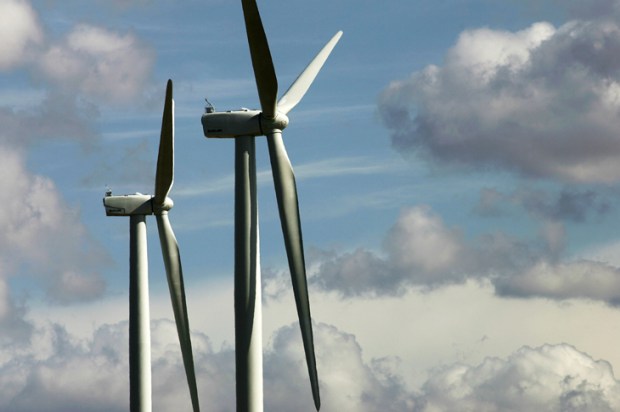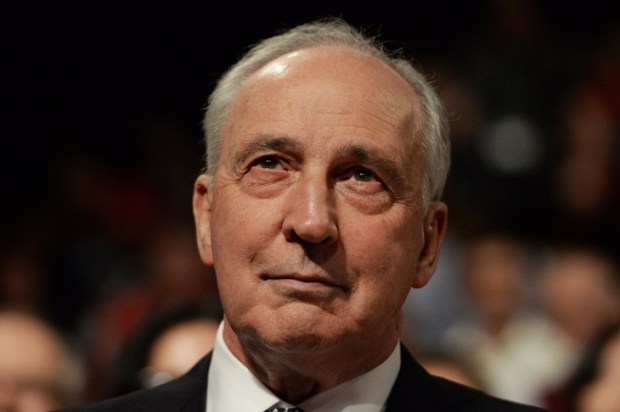Astute readers of the Guardian who have been wondering why there were so few ads for coal, gas and oil in its pages of late finally have an answer. The paper has taken the heroic decision to forgo the filthy lucre of fossil fuel extractive companies. It’s true that Saudi Aramco, Chevron, Gazprom, Exxon and National Iranian Oil, the top five companies in this category, are hardly household names. Indeed, it’s hard to recall the last time these villains ran an ad in the Guardian. Readers hoping therefore that the paper might go a little further, banning ads, for example, for products with a significant carbon footprint, such as cars or holidays will be disappointed.
Ads for airlines and far-flung travel destinations festoon the Guardian’s travel pages, even though, as its journalists tell us, airline CO2 emissions, which account for 2.5 per cent of global emissions, are rising 70 per cent faster than predicted. Indeed, as the Guardian reminded readers last year, a short-haul return flight from London to Edinburgh contributes more CO2 than the mean annual emissions of a person in Uganda.
For those who aren’t squeamish about their carbon footprint, there’s a Guardian ‘insider’s guide’ to Kampala, where a Rolex — a street food wrap not a watch we are wittily told —is something you eat. Only 15 per cent of the UK’s population took 70 per cent of flights but given that the Guardian is, in the words of the son of its founder ‘a paper that will remain bourgeois to the last’, no doubt a disproportionate percentage of those flights were taken by Guardian readers.
Discreet electric car ads pay for the Guardian’s motoring pages and since 40 per cent of power stations in the UK and 86 per cent of power stations in Australia are fossil-fuelled so are the vehicles they charge. In any event, the section is full of articles for conventional cars that read like advertisements.
Yet as the Guardian recently reminded us, transport is the fastest-growing contributor to global emissions, accounting for around a third of the total in Europe and the US, with an International Energy Agency study showing that growing demand for SUVs is the second largest contributor to the increase in global CO2 emissions from 2010 to 2018. Only power generation drove a larger increase in emissions, putting SUVs ahead of heavy industry (including iron, steel, cement and aluminium), aviation and shipping.
That didn’t stop the motoring writer cooing about the latest SEAT SUV which, he said, was ‘blessed with style and practicality,’ even if it generates 166g of CO2 per km by consuming the fossil fuels extracted by those evil companies whose ads the Guardian declines to run.
So why does the Guardian run ads for the products that are keeping the fossil fuel barons in business? As its CEO explains, ‘Stopping those ads would be a severe financial blow and might force us to make significant cuts to Guardian and Observer journalism around the world.’ Well, well. For a paper which claims we are facing a ‘climate crisis’ this seems a little self-indulgent.
At the last election, the Australian Labor party called for a 45 per cent cut in emissions based on 2005 levels. An independent study estimated that Labor’s plans would result in cumulative economic losses of $472bn over the decade, with GDP $144bn a year lower by 2030, 336,000 fewer jobs and the average full-time wage around $97,400, a reduction of 8 per cent, translating to a fall in real annual wages of about $9000 per year. The Guardian’s climate policy goes further calling for a halving of emissions by 2030.
It seems the Guardian is happy to advocate policies that impose wage cuts and job losses for others, but when it comes to their own jobs they do not believe in reckless gestures that threaten their own economic prosperity. Its journalists are not prepared to accept wage cuts and job losses — or work for free — to save the planet. In this, they were in tune with the rest of the country. Recent polling conducted for Channel Nine newspapers, and buried at the end of the articles, confirmed that voters wanted action on climate change but ‘they rejected the idea of paying more for electrical power or petrol, or more generally, except for one Greens voter in the Melbourne group.’
Yet why is the Guardian merely forgoing fossil fuel ad revenue instead of forgoing fossil fuels? The Guardian trumpets the fact that it generates 40 per cent of its revenue through advertisements, particularly ‘high quality digital adverts’ which reach millions of Guardian readers on their laptop or phone. Hello, Guardian? The internet uses around 10 per cent of the world’s electricity consumption, about the same amount as global residential space heating. The most recent figures available put that at more than 21,000 terawatt hours. Almost 40 per cent of that electricity is generated by coal and almost 25 per cent by gas, with less than 10 per cent generated by renewables. Online advertising, which funds the internet, was estimated in 2018 to have consumed up to 280 terawatt hours of energy, emitting almost 160 million tons of CO2e.
In reality, far from cutting its fossil-fuelled online advertising, the whole grand gesture is, apparently, a crafty ploy to increase it. As its CEO explained, ‘We believe many brands will agree with our stance and might be persuaded to choose to work with us more.’
‘How do we rein in the fossil fuel industry?’ asked the Guardian last October, suggesting ‘public shaming’ could force companies to own up to their activities and scale back demand. We’ll be able to test that theory on the Guardian, but it seems more likely that the only renewable resource they are likely to draw on anytime soon is the inexhaustible supply of Green hypocrisy.
Last month the Guardian snickered at Joker star Joaquin Phoenix for doing his bit ‘to reduce waste’ by vowing to wear the same tuxedo to all the award ceremonies he attends this season.
It smugly reported the ridicule he attracted in social media; ‘He’s wearing a suit more than once,’ tweeted one critic. ‘Gandhi, Mother Teresa, Nelson Mandela take a seat; a new hero is in town.’ Come on Guardian; don’t be so modest. With your ban on fossil fuel ads, you’re a hero too.
Got something to add? Join the discussion and comment below.
Get 10 issues for just $10
Subscribe to The Spectator Australia today for the next 10 magazine issues, plus full online access, for just $10.
You might disagree with half of it, but you’ll enjoy reading all of it. Try your first month for free, then just $2 a week for the remainder of your first year.














Comments
Don't miss out
Join the conversation with other Spectator Australia readers. Subscribe to leave a comment.
SUBSCRIBEAlready a subscriber? Log in